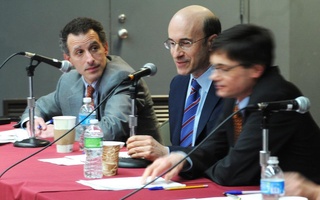After coming under fire last week for a Microsoft Excel error and what have been called unconventional research methods in a prominent 2010 macroeconomics paper, Harvard Kennedy School professor Carmen M. Reinhart and economics and public policy professor Kenneth S. Rogoff are continuing to defend their research, saying that despite one mistake, their core conclusions remain unchanged.
In their study, entitled “Growth in a Time of Debt,” Reinhart and Rogoff found that when the size of a country’s debt exceeds 90 percent of its gross domestic product, economic growth slows dramatically. The paper has been cited extensively by policymakers—including Olli Rehn of the European Commission and U.S. Representative Paul D. Ryan—pushing for major budget cuts in Europe and the United States.
But on April 15, a trio of researchers at the University of Massachusetts, Amherst, published a paper that found fault with three aspects of the Harvard researchers’ influential study. The Amherst researchers discovered that Reinhart and Rogoff had made a basic coding error in Excel that undermined their key calculation of average GDP growth in nations with high levels of public debt. The Amherst researchers also took issue with Reinhart and Rogoff’s methodology, which omitted several years of data for some countries in the sample and assigned equal weight to all of the nations analyzed in the study.
In a response published the next day, Reinhart and Rogoff stood behind both their research methodology and their results before acknowledging the Excel error in a second statement a day later.
“We are grateful to Herndon et al. for the careful attention to our...paper and for pointing out an important correction,” they wrote in the second statement. “It is sobering that such an error slipped into one of our papers despite our best efforts to be consistently careful. We do not, however, believe this regrettable slip affects in any significant way the central message of the paper.”
Reinhart and Rogoff wrote that they “object to in the strongest terms” the Amherst researchers’s claim that Reinhart and Rogoff “selectively omitted” data in their sample, saying that they had left out certain years from their data set because data for those periods had not yet been constructed. In response to the charge that Reinhart and Rogoff’s equal weighting of all countries exaggerated their results, the Harvard researchers explained that they had used this method to avoid disproportionately weighting countries that may have experienced specific peculiarities.
Rogoff wrote in an email to The Crimson that he and Reinhart are currently writing a third response to the criticism that they expect to release sometime this week.Princeton professor and Nobel Prize-winning economist Paul Krugman has published several articles sharply criticizing Reinhart and Rogoff’s response to the Amherst researchers’ critique. He called their first response “disappointing” and “evasive,” and the second one “disingenuous.”
But Henning Bohn, an economics professor at the University of California, Santa Barbara, expressed sympathy for Reinhart and Rogoff, saying “anybody can make a little error.” He credited the two Harvard researchers for their “transparency” throughout the dispute.
When asked about the implications of the Excel error, Bohn explained that the slight changes in the numbers did not faze him.
“This little glitch should not detract from the main message of their research,” he said.
Read more in News
Deputy Secretary of Defense Discusses Wartime Spending and OutlookRecommended Articles
-
Ex-Grad Student Alleges MisconductA former graduate student’s mass e-mail to hundreds of College students alleging “administrative misconduct” at Harvard sparked heated debate over undergraduate e-mail lists Friday about discrimination on campus.
-
LETTERS—EC GRAD STUDENT E-MAILSIt saddens me that The Crimson has chosen to contribute to harassment rather than to oppose it.
-
 Harvard Professors Discuss Financial Crisis
Harvard Professors Discuss Financial Crisis -
National Academy of Sciences Elects Nine Harvard Faculty MembersLast week, eight Harvard professors and one senior lecturer were elected to the National Academy of Sciences in recognition of their original research.
-
 Kenneth Rogoff Talks China Economics
Kenneth Rogoff Talks China Economics -
Comedian Lewis Black Stresses Need for Passion in CareerGrammy Award-winning comedian Lewis N. Black stressed the importance of pursuing one’s passions at a “Conversations with Kirkland” event on Monday afternoon, including fits of laughter along the way.













